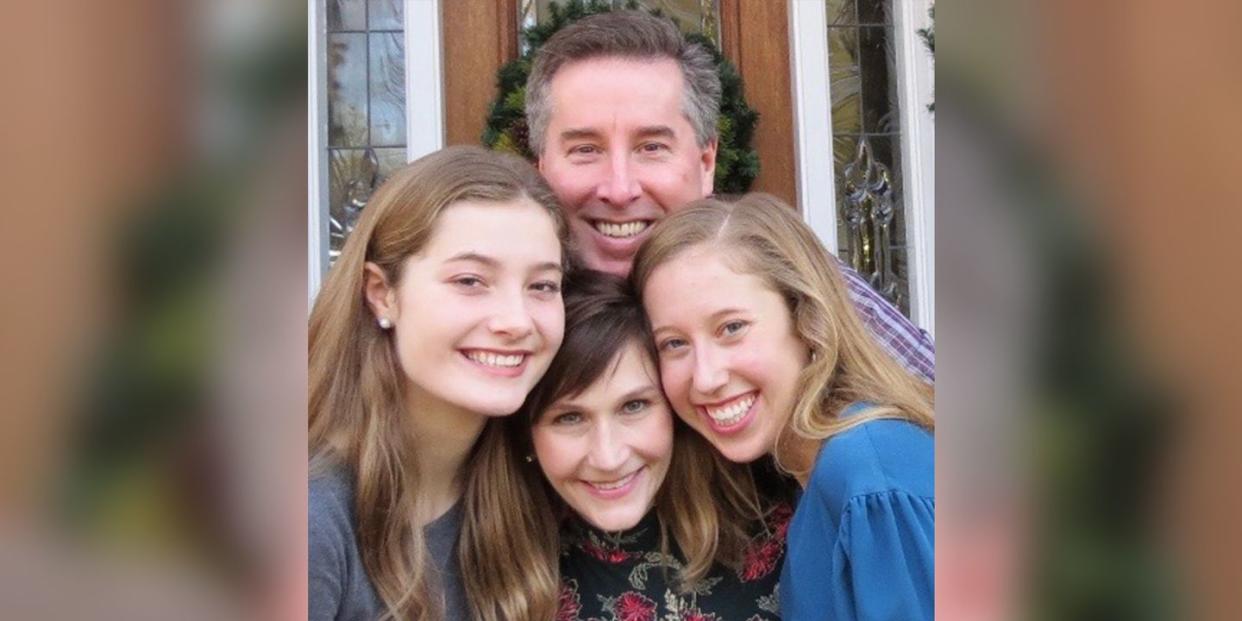Why I Want All Breast Cancer Patients to Get Genetic Testing

In 2000, Alex Frenzel was a 28-year-old new mom who noticed something was off with one of her breasts. “I kept feeling this lump that felt different than a clogged milk duct lump,” she says. Frenzel mentioned it to her OBGYN. “He dismissed it as breast changes due to pregnancy and breastfeeding,” she says.
But the lump didn’t go away. “I continued to ask about it,” Frenzel says. She was referred to a lactation consultant, who thought it was a clogged milk duct. But she still had a gut feeling something wasn’t right. So, she asked to see another OBGYN who “reluctantly agreed to have me see a surgeon for a consult,” she says. “Finally, a biopsy was done.” After eight months of pushing for an answer, Frenzel finally had one: She had stage 2 breast cancer. “I didn’t feel sick at the time,” she recalls. “If I hadn’t been nursing, I’m not sure I would have even noticed it.”
The oncologist recommended a lumpectomy, a surgical procedure that removes the cancer while leaving as much breast tissue as possible, “just to see how I would do,” she says. But Frenzel says her doctor didn't seem sure it was the best course of action for her. She felt as though she was being given the standard treatment without much thought to her individual case. So, she sought a second and third opinion. Finally, at University of Texas M.D. Anderson Cancer Center in Houston, a doctor suggested she do genetic testing because of her family history.
“My mother died of breast cancer when she was 41—I was 15 at the time,” Frenzel says. “Back then, we didn’t know a lot about genetics,” she says. “But when I was diagnosed, genetic testing was starting to be used more often.”
Frenzel says she was always “proactive” about her healthcare due to her mother’s early death. “But my knowledge did not prepare me to hear the words of my own diagnosis, especially at the age of 29,” she says. Her genetic test revealed that she had a harmful BRCA 1 mutation. “The doctor said a lumpectomy was not the best thing for me—it wouldn’t do anything, and the cancer would spread,” she says. “I’m so glad I got tested.”
What is a BRCA mutation?
BRCA1 and BRCA2 genes are genes that produce proteins that suppress tumors and tumor growth, according to the National Cancer Institute (NCI). Under normal circumstances, those proteins help repair damaged DNA. But when either the BRCA 1 or BRCA 2 gene is mutated, DNA damage may not be repaired. And those damaged cells are more likely to develop genetic alterations that can lead to cancer.
Not all BRCA gene mutations are thought to be harmful, but many are, and they can be passed through families, according to the NCI. Several cancers, including breast, ovarian, fallopian tube, abdominal cavity, prostate, pancreatic, and colon cancers, have been linked to harmful BRCA gene mutations. Often, these genetic mutations can explain why someone may have a family history of certain types of cancer, the NCI says.
Between one in 300 people to one in 800 people are estimated to carry a BRCA1 or BRCA2 mutation, according to the American College of Obstetricians and Gynecologists (ACOG). On average, a woman with a BRCA1 or BRCA2 gene mutation has up to a 7 in 10 chance of getting breast cancer by age 80, according to the American Cancer Society (ACS). (By comparison, the average woman has a one in eight chance of developing breast cancer in her lifetime, according to the ACS.)
Knowing that you have a harmful BRCA gene mutation make you aware of your risk of developing certain types of cancer, so that you can be proactive about screening and prevention methods. And, if you’ve already been diagnosed with cancer, knowing you have a harmful BRCA gene mutation can dictate the course of your treatment. This was the case for Frenzel.
Frenzel believes knowing her BRCA status helped save her life.
To lower the chances that her cancer would return, and give her the “best possible outcome,” it was recommended that Frenzel get a double mastectomy, hysterectomy, chemotherapy, and radiation. “It was a totally different treatment plan after I did testing,” she says. “If you have certain genetic mutations, it’s harder for you to get rid of cancer and have it stay away.” She and her medical team “threw everything at the cancer,” and after her treatment, she enjoyed 16 years of remission. Unfortunately, however, four years ago, the cancer came back.
Frenzel is now 49 and has metastatic, stage 4 breast cancer. But, she says, that doesn’t mean her previous treatment didn’t work. “I truly believe that if I hadn’t had genetic testing 20 years ago, I wouldn’t be here today,” she says. Doctors have told her that simply having a lumpectomy or even undergoing chemotherapy when she was first diagnosed wouldn’t have made a difference because the source of her cancer is genetic.
Keeping her sense of humor intact, Frenzel jokes that she’s now “back at the game” with cancer treatment. She’s currently part of a clinical trial for a medication to target her particular BRCA mutation. When asked for the one piece of advice she’d share with other women in her position, she urges others who have been diagnosed with cancer and who have a family history of the disease to ask their doctor about genetic testing. “It’s just one more piece of the puzzle that your doctor can use to decide what the best treatment should be for you. One size doesn’t fit all,” she says. “Knowledge is power. The more information you have, the better.”
You Might Also Like


